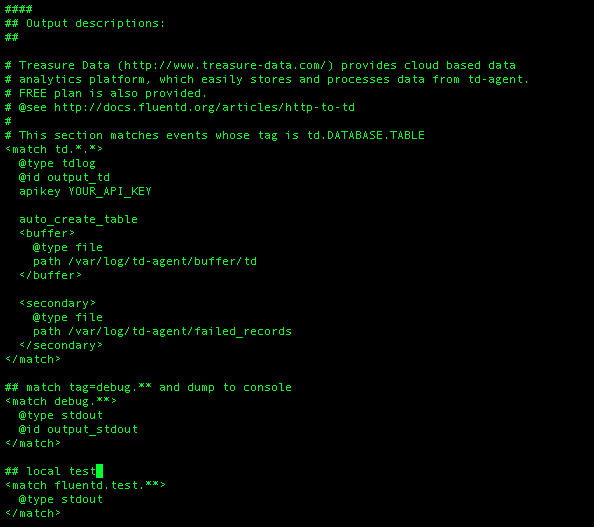설정 예제 가이드대로 td-agent.conf를 바꿔본다.
1 2 3 <match fluentd.test.**> @type stdout </match>
그리고 나서 td-agent를 종료 후 다시 켜 주면 된다. 근데 match랑 source가 뭔지 보고 가자.
match
“match” 지시문은 일치하는 태그가 있는 이벤트를 찾아서 처리합니다, 일치하는 태그가 있는 이벤트를 찾아서 처리합니다
공홈의 내용을 번역기로 돌렸더니 아 뭔가 카테고리나 네임스페이스인가? 라는 생각이 들었다.
source
입력 소스는 소스 지시문을 사용하여 원하는 입력 플러그인을 선택하고 구성하여 활성화됩니다.
1 2 3 4 5 6 7 8 9 <source> @type forward @id input_forward </source> <source> @type http @id input_http port 8888 </source>
아 여기로 로그를 보내는건가 보군! 이란 생각이 들었음. 여러 개 추가 된다고 한다.
전송하기 예제 코드를 따라가 보며 해 본다.
패키지 설치 코드 1 2 3 4 5 6 7 8 9 10 const logger = require ('fluent-logger' );logger.configure('fluentd.test' , { host: 'localhost' , port: 24224 , timeout: 3.0 , reconnectInterval: 600000 , }); logger.emit('join' , {id : 'a' , name : 'delryn' , age : 32 });
실행 결과는 아래 명령어를 쳐 보면 나온다.
1 2 tail -n 1 /var/log /td-agent/td-agent.log 2020-05-09 17:45:47.000000000 +0900 fluentd.test.join: {"id" :"a" ,"name" :"delryn" ,"age" :32}
어플리케이션 -> agent 연결된 상태이기 때문에 agent를 종료하면 연결이 끊기는 메세지를 볼수 있다.
1 2 3 4 5 6 7 8 Fluentd error { Error: connect ECONNREFUSED 127.0.0.1:24224 at TCPConnectWrap.afterConnect [as oncomplete] (net.js:1106:14) errno: 'ECONNREFUSED' , code: 'ECONNREFUSED' , syscall: 'connect' , address: '127.0.0.1' , port: 24224 } Fluentd will reconnect after 600 seconds
winston, morgan으로 연동 이전에 해본 winston + morgan 로그를 fluentd로 보내서 파일을 생성하게 해 보자.
설정 추가 기존 conf를 참조해서 한번 추가 해보았다.
1 2 3 4 5 6 7 8 9 <match myproject.app.**> @type file path /var/log/td-agent/myproject/app </match> <match myproject.http.**> @type file path /var/log/td-agent/myproject/http </match>
코드 작성 이전 에 작성한 코드에 추가 해 본다.
logger.js1 2 3 4 5 6 7 8 9 10 11 12 13 14 15 16 17 18 19 20 21 22 23 24 25 26 27 28 29 30 31 32 33 34 35 36 37 38 39 40 41 42 43 44 45 46 47 48 49 50 51 52 53 54 55 56 57 const { createLogger, format, transports } = require ('winston' );const fluentTransport = require ('fluent-logger' ).support.winstonTransport();const mt = require ('moment-timezone' );const { combine, label, printf } = format;const date = mt().tz('Asia/Seoul' );const myFormat = printf(info =>`${info.timestamp} [${info.level} ]: ${info.label} - ${info.message} ` );const koreaTime = format((info ) => { info.timestamp = date.format(); return info; }); const fluentConfig = { host: 'localhost' , port: 24224 , timeout: 3.0 , requireAckResponse: false , }; const fluentInit = (tag ) => { const init = new fluentTransport(tag, fluentConfig); return init; } const appLogger = (category ) => { const init = createLogger({ format: combine( label({ label : category }), koreaTime(), myFormat, ), transports: [fluentInit('myproject.app' )], }); return init; }; const httpLogger = createLogger({ format: combine( label({ label : 'http' }), koreaTime(), myFormat, ), transports: [fluentInit('myproject.http' )], }); const httpLogStream = { write: (message ) => { httpLogger.log({ level: 'info' , message: message, }); }, }; exports .appLogger = appLogger;exports .httpLogStream = httpLogStream;
index.js1 2 3 4 5 6 7 8 9 10 11 12 13 14 15 16 17 18 19 20 21 22 23 24 25 26 27 28 29 30 31 32 33 34 35 36 37 38 39 const express = require ('express' );const morgan = require ("morgan" );const logger = require ('./logger' );const app = express();const PORT = process.env.PORT || 3000 ;const morganFormat = process.env.NODE_ENV !== "production" ? "dev" : "combined" ;app.use(morgan(morganFormat, { stream : logger.httpLogStream })); app.get('/' , (req, res ) => { res.send('hihi' ); }); app.get('/set-item' , (req, res ) => { const { id, name, item_id } = req.query; if (typeof id === 'undefined' || typeof name === 'undefined' || typeof item_id === 'undefined' ) { logger.appLogger('spend_item' ).log({ level: 'warn' , message: '파라미터 누락' , }); return res.status(200 ).json({ statusCode : 403 , message : '파라미터 누락' }); } if (typeof item_id !== 'string' || !item_id.includes('item_' )) { logger.appLogger('spend_item' ).log({ level: 'error' , message: '잘못된 아이템 타입' , }); return res.status(200 ).json({ statusCode : 500 , message : '잘못된 아이템 타입' }); } logger.appLogger('spend_item' ).log({ level: 'info' , message: `user_id: ${id} , name: ${name} , 획득 아이템: ${item_id} ` , }); return res.status(200 ).json({ statusCode : 200 , message : '처리 성공' }); }); app.listen(PORT, () => console .log(`app listening on port ${PORT} ` ));
실행을 해서 테스트를 하고 내가 설정한 경로에서 로그를 찾아보면 기록이 남아 있다.
1 2 3 2020-05-09T19:35:19+09:00 myproject.app {"level" :"info" ,"message" :"user_id: abc, name: 123, 획득 아이템: item_123" ,"label" :"spend_item" ,"timestamp" :"2020-05-09T19:35:17+09:00" } 2020-05-09T19:35:19+09:00 myproject.http {"level" :"info" ,"message" :"\u001B[0mGET /set-item?id=abc&name=123&item_id=item_123 \u001B[32m200\u001B[0m 8.309 ms - 44\u001B[0m\n" ,"label" :"http" ,"timestamp" :"2020-05-09T19:35:17+09:00" }
s3 연동 로컬 파일이 아닌 s3에 파일을 업로드하도록 바꿔보자
설정 변경 이전 설정은 주석으로 해두고 새 설정을 추가 하자.
1 2 3 4 5 6 7 8 9 10 11 12 13 14 15 16 17 18 19 20 21 22 23 24 25 26 27 28 29 30 31 32 33 34 35 <match myproject.app.**> @type s3 aws_key_id AWS 키 aws_sec_key AWS 시크릿 키 s3_bucket s3 버켓명 s3_region 리전 path logs/${tag}/%Y/%m/%d/ # 저장할 s3 디렉토리 <buffer tag,time> @type file path /var/log/fluent/s3/app # 버퍼로 갖고 있을 디텍토리 설정 timekey 0 # timekey는 시간 timekey_wait 10s # timekey_wait는 초 또는 분 (s, m) timekey_use_utc true # use utc chunk_limit_size 256m # 버퍼 파일 크기 지정 </buffer> </match> <match myproject.http.**> @type s3 aws_key_id AWS 키 aws_sec_key AWS 시크릿 키 s3_bucket s3 버켓명 s3_region 리전 path logs/${tag}/%Y/%m/%d/ <buffer tag,time> @type file path /var/log/fluent/s3/http timekey 0 timekey_wait 10s timekey_use_utc true chunk_limit_size 256m </buffer> </match>
timekey, timekey_wait에 설정한 시간단위 별로 버퍼에 담아둔 로그를 s3에 업로드한다.
지금은 10초마다 업로드해놓게끔 해놨고 실제 어플리케이션에서 테스트를 해봤을 시
gzip으로 압축 되서 올라 간다.

